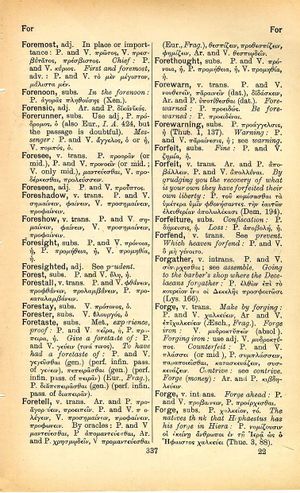forfeit: Difference between revisions
From LSJ
τὸ λακωνίζειν πολὺ μᾶλλόν ἐστιν φιλοσοφεῖν ἢ φιλογυμναστεῖν → to behave like a Lacedaemonian is much more to love wisdom than to love gymnastics (Plato, Protagoras 342e6)
(CSV4) |
m (Woodhouse1 replacement) |
||
| Line 1: | Line 1: | ||
{{Woodhouse1 | {{Woodhouse1 | ||
|Text=[[File:woodhouse_337.jpg|thumb|link={{filepath:woodhouse_337.jpg}}]] | |Text=[[File:woodhouse_337.jpg|thumb|link={{filepath:woodhouse_337.jpg}}]] | ||
===substantive=== | |||
Ar. and P. ἀποβάλλειν. P. and V. [[ἀπόλλυμι | [[fine]]: [[prose|P.]] and [[verse|V.]] [[ζημία]], ἡ. | ||
===verb transitive=== | |||
[[Aristophanes|Ar.]] and [[prose|P.]] [[ἀποβάλλειν]]. [[prose|P.]] and [[verse|V.]] [[ἀπόλλυμι]], [[ἀπολλύναι]]. | |||
[[by grudging you the recovery of what is your own they have forfeited their own liberty]]: [[prose|P.]] [[τοῦ κομίσασθαι τὰ ὑμέτερα ὑμῖν φθονήσαντες]], [[τὴν ἑαυτῶν ἐλευθερίαν ἀπολωλέκασι]] ([[Demosthenes|Dem.]] 194). | |||
}} | }} | ||
Revision as of 08:53, 20 May 2020
English > Greek (Woodhouse)
substantive
verb transitive
Ar. and P. ἀποβάλλειν. P. and V. ἀπόλλυμι, ἀπολλύναι.
by grudging you the recovery of what is your own they have forfeited their own liberty: P. τοῦ κομίσασθαι τὰ ὑμέτερα ὑμῖν φθονήσαντες, τὴν ἑαυτῶν ἐλευθερίαν ἀπολωλέκασι (Dem. 194).

